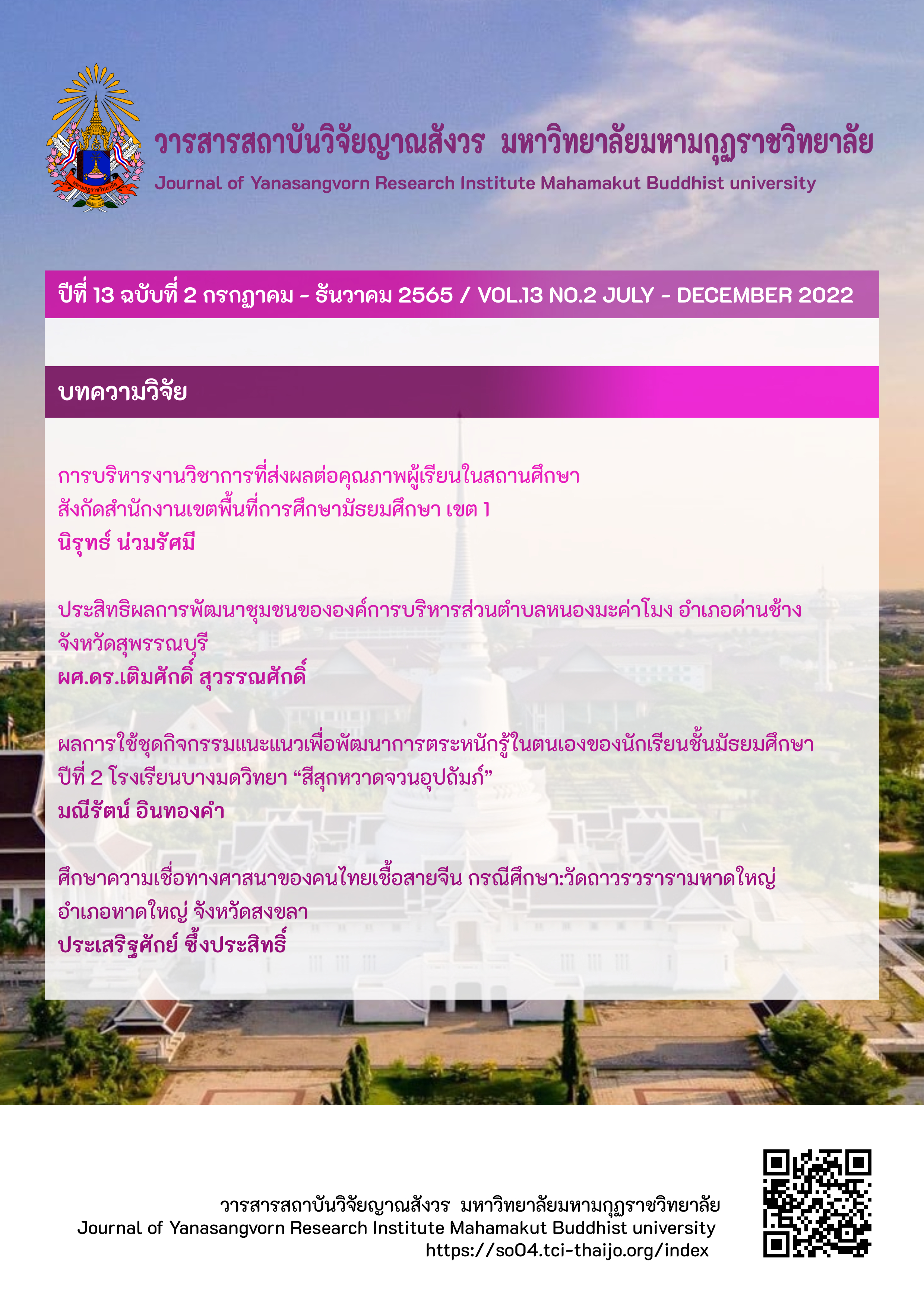THE PARTICIPATORY COMMUNITY MANAGEMENT TO ENHANCE THE QUALITY OF LIFE DEVELOPMENT PROCESS FOR THE ELDERLY SOCIETY IN BUDDHIST WAY
Main Article Content
Abstract
The objectives of this research were 1. to study the condition of community participatory management to enhance the process of improving the quality of life of the elderly society in a Buddhist way. 2. to develop a community participative management model and 3. to assess the effectiveness of the community participatory management model. The sample consisted of 380 elderly people in Sampran District Nakhon Pathom Province, and 27 people involved in the community. The research instruments were questionnaires, interview forms and observation forms. Data were collected by survey, interview, group discussion. Data were analyzed by frequency, percentage, standard deviation, confirmatory factor analysis, and content analysis.
The results of the investigation found that 1. The condition of community participatory management has established the Elderly Club. The obstacle to the process of improving the quality of life is economic growth, the elderly are alone, adaptation to modern culture and disease. 2.The community participatory management model was divided into 6 aspects: including 2.1 body responsibility 2.2 mental development 2.3 personal independence 2.4 personal beliefs 2.5 Social relations and 2.6 Environmental conditions 3. The evaluation of the effectiveness of the community participatory management model was found that the pattern is appropriate, possible and put it to good use.
Article Details

This work is licensed under a Creative Commons Attribution 4.0 International License.
References
กรมกิจการผู้สูงอายุ มูลนิธิบูรณะชนบทแห่งประเทศไทย. (2559). แนวทางการดำเนินธุรกิจเพื่อสังคม (CSR) /กิจกรรมเพื่อสังคม (SE) สำหรับผู้สูงอายุ. (รายงานการ
วิจัย). สถาบันไทยพัฒน์.
จารุณี จันทร์เปล่ง. (2563). รูปแบบการเตรียมชุมชนเพื่อรองรับสังคมผู้สูงอายุในเขตภาคกลางของประเทศไทย. (ปริญญาดุษฎีนิพนธ์), มหาวิทยาลัยมหาจุฬาลงกรณราช
วิทยาลัย
ธนาคารแห่งประเทศไทย. (2561). ความท้าทายของภาวะสังคมผู้สูงอายุของประเทศไทย. สืบค้นเมื่อวันที่ 2 เมษายน 2564, จาก
https://www.bot.or.th/Thai/Pages/default.aspx.
พระพรหมคุณาภรณ์ (ป.อ. ปยุตโต). (2549). พุทธธรรมฉบับปรับปรุงและขยายความ. กรุงเทพฯ: สหธรรม.
พระธรรมโกศาจารย์ (พุทธทาสภิกขุ). (2554). ธรรมะเพื่อการบริหาร. กรุงเทพฯ: โรงพิมพ์สำนักงานพระพุทธศาสนาแห่งชาติ.
ศิลปสวย ระวีแสงสูรย์. (2559). แนวทางการพัฒนาคุณภาพการดูแลผู้สูงอายุของกรุงเทพมหานครเพื่อรองรับสังคมผู้สูงอายุ. (รายงานการวิจัย). กรุงเทพฯ: วิทยาลัยป้องกันราชอาณาจักร.
Chen, J., Murayama, S., & Kamibeppu, K. (2010). Factors related to well-being among the elderly in urban China focusing on multiple roles.
Bioscience trends, 4(2).Yaxin Zhu,
Zhu, Y., Liu, J., Qu, B., & Yi, Z. (2018). Quality of life, loneliness and health-related characteristics among older people in Liaoning province,
China: a cross- sectional study. BMJ open, 8(11), e021822.


